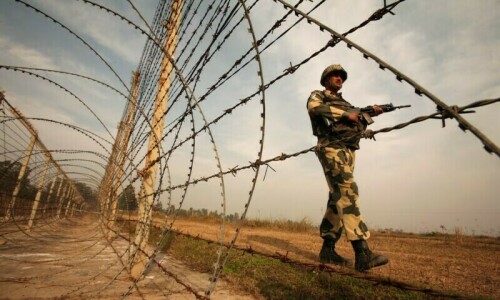KARACHI: On a recent Sunday Afghans living in the city held a big demonstration at the Karachi Press Club to echo their demand for the issuance of Pakistani national identity cards. Holding Pakistani flags and banners bearing pictures of Prime Minister Imran Khan, who had earlier revived their hopes of getting recognition of their nationality, they chanted slogans in favour of the Pakistan Tehreek-i-Insaf government and demanded that immediate measures be taken to get them out of the desperate situation of neither being here nor there.
The announcement made by the prime minister that Afghans and Bengali-speaking people living in Pakistan would be granted Pakistan’s citizenship has kindled a ray of hope in members of the two communities. Since then their activists have been holding demos to draw the attention of the government towards their plight.
The unexpected announcement made at a fundraising dinner in Karachi has also provoked various political parties to issue statements, callously decrying the idea. Although the Muttahida Qaumi Movement-Pakistan has also shown its opposition to the move, Pakistan Peoples Party leaders have been more vocal on the issue, airing their views at every available forum. Lawyers in Larkana have also held a demonstration against permanent settlement of ‘aliens’ on Sindh’s soil. The smaller, ‘nationalist’, groups have also found an opportunity to get their share of the limelight by taking to the streets or issuing statements.
‘The first thing I will do [back in Islamabad] is get [Bengali-speaking] people issued passports and national identity cards’
Pak Sarzameen Party leader Syed Mustafa Kamal favours the grant of citizenship but apparently only to the Bengalis, most of who have settled in this part of the country even before the creation of Bangladesh in 1971. Neither they have any intention to go to Bangladesh, nor is that country keen to accept them as its citizens. Naturally, Bengalis and Burmese, fused together, consider this country their homeland.
Similarly, Afghans, accepted by Sindh as refugees after the invasion of their country by the Soviet Union in 1979, have taken firm roots here. Many of them have established their own businesses and built plazas in parts of Pakistan over the decades and do not fancy going back to the country of their origin, where the security situation is also unfavourable for such a consideration. Various international agencies have been helping repatriate them. The Japanese government has also announced $2.7 million aid for their repatriation. In fact, thousands have already been sent back to their country whether they liked it or not. Some of them are compelled by circumstances there to return to Pakistan and live here as illegal aliens.
The Jamaat-i-Islami, led by its chief Senator Sirajul Haq, has welcomed the prime minister’s statement. The JI has consistently demanded grant of citizenship to both Afghans and Bengalis living in Pakistan.
The Awami National Party, whose supreme leader Khan Abdul Ghaffar Khan, reverently called Bacha (King) Khan, is buried in Afghanistan’s city of Jalalabad, supports the idea of recognising the aliens as Pakistani. Backing the prime minister’s statement, ANP chief Asfandyar Wali said at a press conference: “It is a normal practice all over the world that a child born in a country is given its citizenship. Pakistan should also grant citizenship to Afghans born here. This is a humanitarian issue and not a political one.”
Imran Khan was reported having said: “The first thing I will do going back [to Islamabad], God willing, is that we will get those people from Bangladesh, who are perhaps living here for more than 40 years and their children have grown older, issued passports and national identity cards.
“And those Afghans whose children have grown older here, who were born in Pakistan, they would also be issued passports and ID cards,” he continued. “When you are born in America, you get the American passport. It is the practice in every country in the world, so why not here? How cruel it is for them.”
Unfortunately for the hapless communities, under obvious pressure from both allies and opponents, Mr Khan later said on the floor of the National Assembly that the final decision to grant citizenship to Afghans and Bengalis would be made only after taking all parties and “stakeholders” into confidence — a phenomenon unlikely to happen. Their dream seems be shattered on the cusp of realisation.

Parliament debate
The prime minister’s statement on granting citizenship to the people of Bengali and Afghan origin in Pakistan sparked a debate in an assembly session.
The issue was raised jointly by the PPP and the Balochistan National Party-Mengal (BNP-M), one of the government allies, through a calling attention notice.
PPP’s Nafisa Shah described the PM’s statement as “insensitive” and said that he had “failed to take the feelings of the locals” of Karachi into consideration.
She said that the prime minister made the statement without realising the “sensitivities” of the metropolis, which she said had fought “civil wars” over resources. She also demanded that the government prepare data on refugees and immigrants living in the country before taking any major decision.
Former foreign minister Hina Rabbani Khar also lashed out at the premier over the statement, calling it “irresponsible”.
“Prime Minister Khan must realise that after becoming premier, he does not represent only his party, but the entire country,” she said. “He can take U-turns as his party’s head, but not as the prime minister — on such important issues.”
BNP-M chief Sardar Akhtar Mengal also opposed the proposal and called for a thorough debate on the issue. He lamented that the government was considering granting citizenship to Bengali and Afghan refugees on humanitarian grounds but the Baloch people were not even treated as humans in their own country.
He sarcastically remarked that illegal immigrants could continue to live in the country “simply by paying a Rs500 fine” and go on to accumulate property worth millions. In a previous session, Mr Mengal had walked out of the assembly during a debate on the same issue in the presence of the PM.
Responding to the arguments made by the PPP and BNP-M, Human Rights Minister Shireen Mazari said the government was ready to debate the issue before taking any decision. She said the PM had met Mr Mengal and assured him that the ruling PTI would consult all parties before arriving at a decision.
Dr Mazari also criticised the PPP, saying that the party had never bothered to collect data about the people living in Karachi despite being in power for more than a decade.
She further said that the Citizenship Act of 1951 granted citizenship status to people born in Pakistan.
“Whether you like it or not, it is the law that those born in Pakistan are Pakistani nationals,” she said.
The issue was also debated in the Senate, where state minister for interior Sheheryar Khan Afridi stated that no decision would be “imposed without national consensus and the matter regarding granting nationality will be debated in parliament”.
State minister for parliamentary affairs Ali Mohammad Khan’s statement was more sugar-coated. He said: “This is our responsibility to help Muslim brothers in trouble.” He recalled the sacrifices of the Bengalis in Karachi when they refused to migrate to Bangladesh after the fall of Dhaka in 1971 and opted to stay on in what was then West Pakistan. However, he also insisted that there should be a national consensus on the issue.
Is a national consensus possible on any disputed issue?
An appeal
Dear Khan Sahib, you are most people’s last hope. They fear that if you fail, it will be gloom all around. Don’t disappoint all of them, including those desperately trying to seek an identity. You have rightly said that it is “cruel” to deny them what is their right under our own Constitution. Condemned to live in slums with little amenities, these people face problems at every step. Without an identity card they cannot get a regular job. They cannot buy a train or plane ticket. They cannot have their children admitted to proper schools. I don’t know how they solemnise their marriages without proper documents as the nikahnama needs ID card numbers.
People in Sindh and Balochistan have their legitimate grievances. Their arguments have weight. But, believe me, sir, this is a humanitarian issue and not a political one, as has been described by Asfandyar Wali. Don’t weigh humanism against politics.
Published in Dawn, October 16th, 2018














































